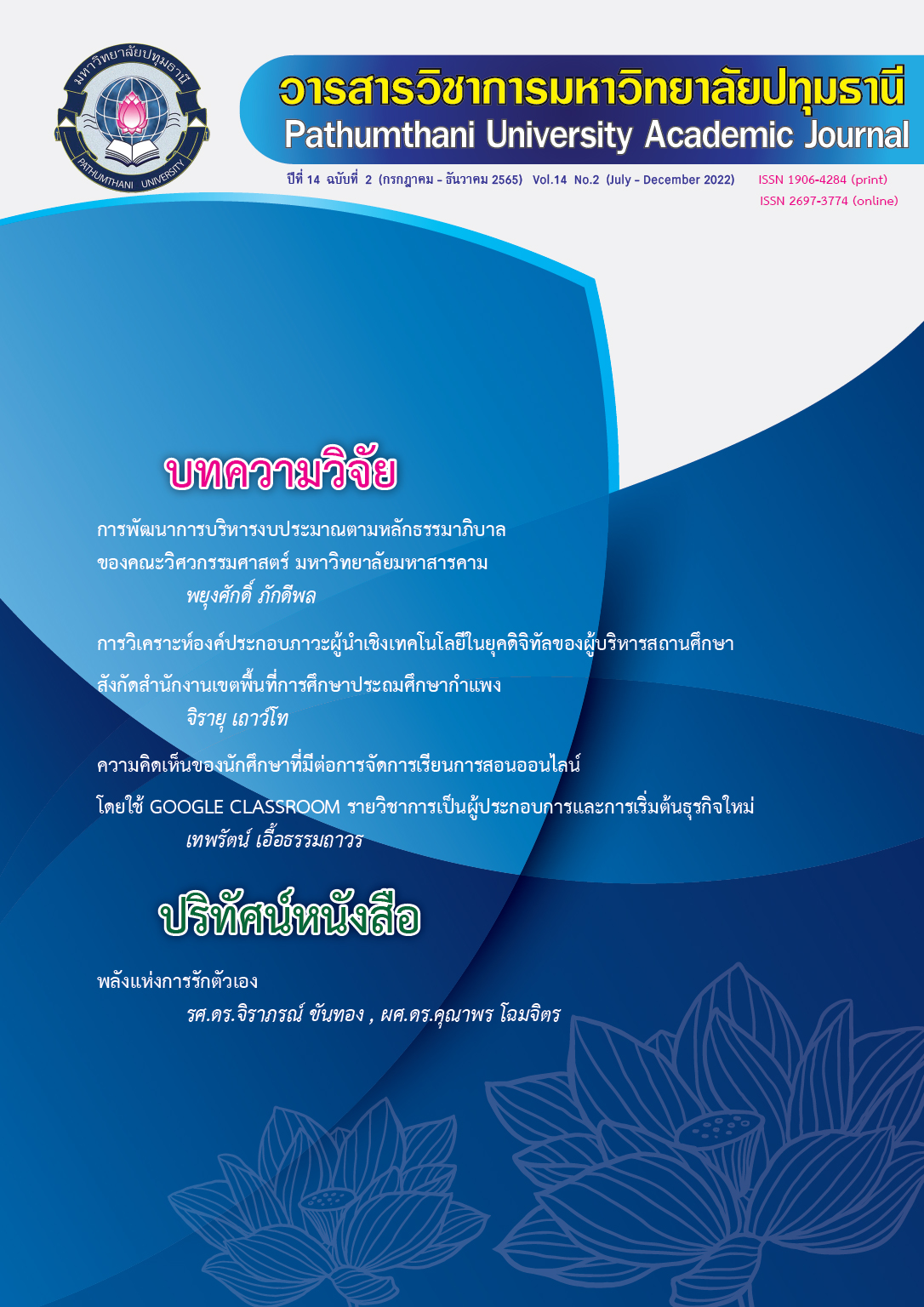DEVELOPMENT OF BUDGET MANAGEMENT IN ACCORDANCE WITH GOOD GOVERNANCE PRINCIPLES OF THE FACULTY OF ENGINEERING MAHASARAKHAM UNIVERSITY
Keywords:
Budget, Management, Good GovernanceAbstract
The objectives of this research were 1) to study the level of budget management according to the principles of good governance of the Faculty of Engineering. Mahasarakham University 2) to study the problem obstacles in managing the budget of the Faculty of Engineering, Mahasarakham University and 3) to study guidelines for developing budget management according to the principles of good governance of the Faculty of Engineering. Mahasarakham University. For quantitative research, a sample of 80 people was used with a 5-level estimation questionnaire. Statistics used in data analysis were frequency, percentage, mean, standard deviation and qualitative research. Target group consisted of 8 people which were 2 administrators, 2 academic staffs, 2 support staffs, and 2 student organization leaders. The data from the target group were obtained by interview method. Data were analyzed by content analysis and descriptive conclusions.
The results of the research revealed that 1) the overall of budget management according to the principles of good governance of the Faculty of Engineering, Mahasarakham University had, the mean at a high level ( =3.99). When considering each side, it was found that the side with the highest mean was the main responsibility ( =4.52) which was in at the highest level. The high level in 5 aspects, ranked by descending order as follows: principle of participation ( =4.14), rule of law ( =3.89), value principle ( =3.87), morality ( =3.83) and transparency ( =3.72), respectively 2) problems and obstacles in budget management according to good governance principles of the Faculty of Engineering Mahasarakham University was found that the principle of transparency still encountered problems about the obstacles in the inspection system of the work within the Faculty, the access to information as appropriate and reporting on the performance of the department for persons in the and out Faculty 3) guidelines for developing budget management according to the principles of good governance of the Faculty of Engineering, Mahasarakham University should be created and managed with stronger internal audit measures by assigning personnel appropriate to the workload of the department.
References
เกษม วัฒนชัย. (2546). การบริหารเพื่อพัฒนาคุณภาพ. กรุงเทพมหานคร : บริษัท เซ็นจูรี่ จำกัด.
บุญชม ศรีสะอาด. (2556). การวิจัยเบื้องต้นฉบับปรับปรุงใหม่. (พิมพ์ครั้งที่ 9). กรุงเทพมหานคร : สุวีริยาสาสน์.
พีรสิทธิ์ คำนวณศิลป์ และ ธัชเฉลิม สุทธิพงษ์ประชา. (2559). พัฒนาการการบริหารภาครัฐไทย: จากอดีตสู่อนาคต Development of Public Sector Management in Thailand: From the Past to the Future. ขอนแก่น : วิทยาลัยการปกครองท้องถิ่น มหาวิทยาลัยขอนแก่น. หน้า 52.
ลัดดา ผลวัฒนะ. (2557). “ธรรมาภิบาลกับการบริหารมหาวิทยาลัยGOOD GOVERNANCE FOR UNIVERSITY ADMINISTRATION”. วารสารการบริหารการศึกษา มหาวิทยาลัยบูรพา. ปีที่ 8 ฉบับที่ 2. (เมษายน - กันยายน 2557) หน้า 25.
สถาบันคลังสมองของชาติ. (2552). ธรรมาภิบาลมหาวิทยาลัย. ปีที่ 1 ฉบับที่ 1. หน้า 10-21.
สามารถ อัยกร และคนอื่น ๆ. “องค์ประกอบของหลักธรรมาภิบาลในมหาวิทยาลัยราชภัฏ”. วารสารวิทยาลัยนครราชสีมา. ปีที่ 12 ฉบับที่ 2. (พฤษภาคม-สิงหาคม). หน้า 280.
_______ . (2561). คู่มือปฏิบัติงานการจัดทําประมาณการรายรับเงินรายได้ ประจําปีงบประมาณ พ.ศ. 2562 มหาวิทยาลัยมหาสารคาม. กองแผนงาน สํานักงานอธิการบดี. 2561, น. 2.
_______ . (2563). รายงานประจำปีคณะวิศวกรรมศาสตร์ มหาวิทยาลัยมหาสารคาม. มหาสารคาม : คลังนานาวิทยา.
Rovinelli, R. J., & Hambleton, R. K. (1977). “On the use of content specialists in the assessment ofcriterion-referenced test item validity”. Dutch Journal of Educational Research. Vol. 2. pp 49-60.
Yamane, Taro. (1973). Statistics: An Introductory Analysis. (3rd ed.). New York: Harper and Row Publications.
Downloads
Published
How to Cite
Issue
Section
License
Copyright (c) 2022 นายพยุงศักดิ์ ภักดีพล

This work is licensed under a Creative Commons Attribution-NonCommercial-NoDerivatives 4.0 International License.
บทความที่ได้รับการตีพิมพ์เป็นลิขสิทธิ์ของวารสารมหาวิทยาลัยปทุมธานี
ข้อความที่ปรากฎในบทความแต่ละเรื่อง เป็นความคิดเห็นส่วนตัวของผู้เขียน กองบรรณาธิการไม่จำเป็นต้องเห็นด้วยเสมอไป และไม่มีส่วนรับผิดชอบใด ๆ ถือเป็นความรับผิดชอบของผู้เขียนแต่เพียงผู้เดียว



